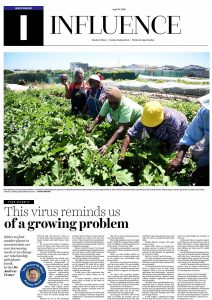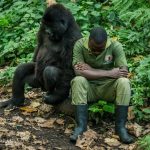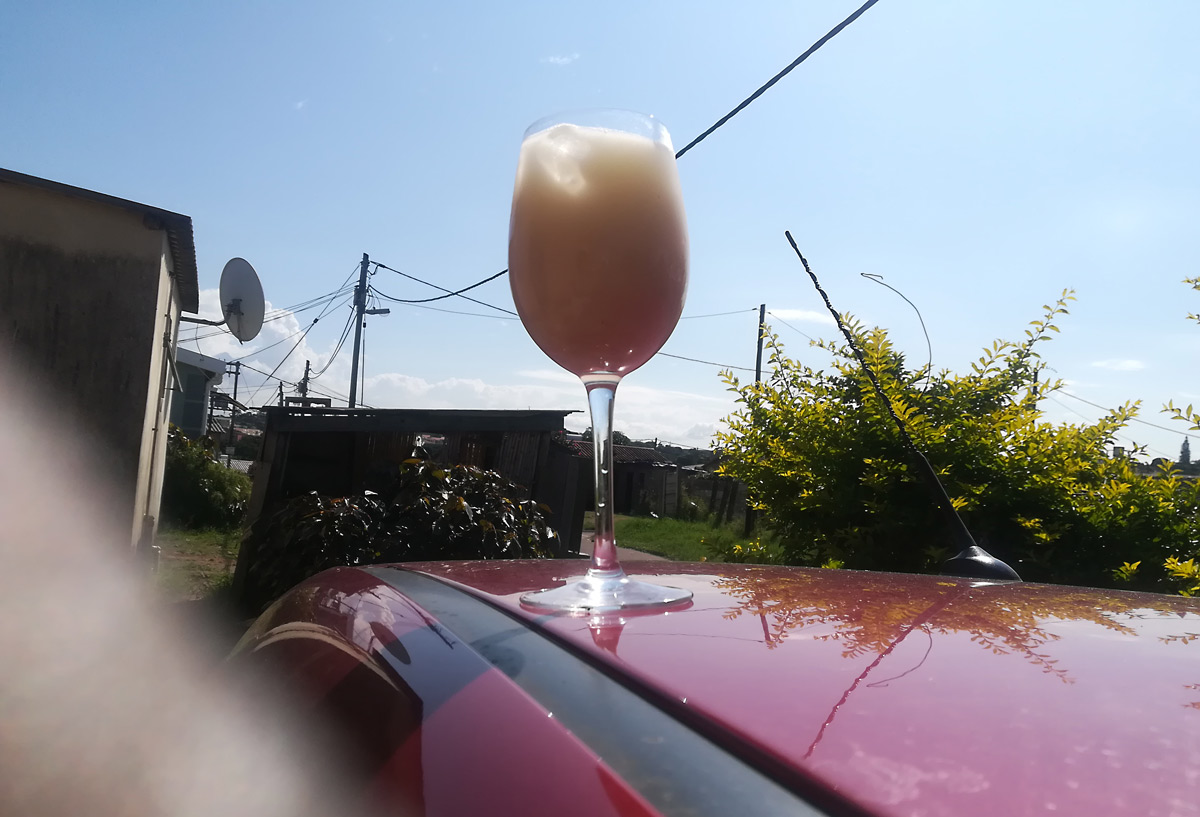This virus reminds us of a growing problem: Either we find another planet to accommodate our ever-increasing needs or we change our relationship with planet Earth, writes Dr Andrew Venter
FREE TO REPUBLISH (see terms below)
The old lady who lived in a shoe, as we know from nursery rhymes, had so many children she didn’t know what to do.
It’s a lesson that comes to mind as Covid-19 throws into stark relief just how central food is to our lives and the stability of our society.
Not since World War II has our global society been so focused on ensuring we have enough to eat.
As the pandemic has spread, governments have put a range of lockdown mechanisms in place, with health care, public safety and food security at the centre.
The pre-lockdown stockpiling, which emptied supermarket shelves, sparking panic and pandemonium, demonstrated our new-found appreciation for the importance of food.
Fortunately, in South Africa, food supply chains have proven robust and resilient.
Generally we’re able to get essentials.
Fine for some
Of course, this is only true for those able to earn an income during lockdown.
Millions are not in this privileged position and for them, income options are running out. Many now fear starvation. They include the unemployed, those unable to work in the informal sectors and those not protected by Covid-19 mitigation measures.
Before Covid-19 about 11% of South Africans suffered hunger regularly. But as the virus takes its toll on the economy, it’s likely to get dramatically worse.
Hunger and a dearth of jobs threaten our already fragile social stability.
The gains we have made in the past two decades forging a more equal society are in jeopardy.
We really do not want to drift back to how it was in 2002, when over 29% of South Africans regularly went hungry.
It will come as no consolation that across most of Africa things are far bleaker.
In many countries, citizens have grown used to living on the brink of starvation.
Now mass starvation looms as food supply chains slow or break or as food exporting countries stockpile food for their own citizens.
Pressing problem
But in many ways the Covid-19 crisis serves to heighten what has long been recognised as a pressing developmental challenge.
How do we feed a growing population into the future?
The world population is now a shade under 7.8 billion, up more than fourfold from 1.8 billion in 1920 and forecast to reach nearly 11 billion by 2100.
It’s simply not sustainable, as research organisation Global Footprint Network has noted.
Either we find another planet to accommodate our ever-increasing needs or we change our relationship with planet Earth.
Herein lies our fundamental disconnect from the reality: We need healthy natural systems to grow the food we need to survive, and these systems have a finite ability to support food production.

Same old
Yet faced with growing populations, needing more food, governments around the world continue to respond with plans to expand food production.
They are committed to increases that fail to match the reality on the ground.
South Africa is no different.
The government wants more farmers farming more land, but it’s far from certain the land can support this.
According to WWF-SA, 68% of our land is suitable for grazing, but climate-soil combinations leave only 12% suitable for growing rain-fed crops. And only 3% can be considered truly fertile land.
Global climate change will make matters worse.
South Africa faces an average temperature increase of about 4oC by the end of the century. This will reduce the amount of land suitable for agriculture by as much as half.
Food security
Back to Covid-19 and its lessons.
We need to embrace our new-found appreciation of the importance of food and focus on food security solutions that are sustainable.
We need bold and creative interventions to improve how we farm. More emphasis must be put on sustainable agriculture and innovations – measures that improve crop yield without destroying ecosystems or leave a legacy of genetically modified organisms, pesticide and herbicides.
In South Africa, established food corporations such as Pioneer Foods, RCL Foods, the Rhodes Food Group and Tiger Brands, have an opportunity to lead the way in implementing environmentally friendly large-scale farming and food processing models.
False choice
It will require a significant change in how they do business, but it’s a false choice to think things can continue as they are.
At the same time, we need to support and embrace food innovations such as Made with Rural, a farmer aggregation and support business that helps small-scale farmers get their food to market at a fair price.
New financial and investment initiatives such as Grobank and The Hatchery will help drive innovation across the food supply chain, support the development of small-scale farming aggregators and catalyze new farming models.
Covid-19 reminds us we need food to survive. Now we need to future-fit our food production models for the emerging sustainability crisis as we continue to over-populate our planet.

• Dr Andrew Venter is the director of the Cambridge Institute for Sustainability Leadership’s operations in South Africa. Venter joined CISL SA from WILDTRUST, where he was chief executive for 19 years. Over this period, he led the development of WILDTRUST into one of the region’s largest and most influential environmental organisations. This story forms part of The Future We Want Series launched by the CISL and Roving Reporters in response to the Covid-19 pandemic.
You may republish this article, so long as you credit the author and Roving Reporters, and do not change the text. Please include a link back to the original article.

Now read… Pandemic punishes but powers school digital switch
Also read this BBC report… Coronavirus: World risks ‘biblical’ famines due to pandemic – UN
Click on the image below to read more stories in our series of Coronavirus Chronicles
References
https://www.gov.za/about-sa/agriculture.
https://theconversation.com/land-reform-and-hunger-in-south-africa-why-the-two-go-hand-in-hand-96684













